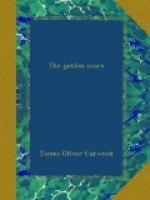Still, as the twilight of dawn took the place of night, he did not move, except to draw himself a little closer into the shelter of the scrub spruce behind which he had hidden himself. He wondered if Celie would be frightened at his absence. But he could not compel himself to go on—or back. Something was coming! He was as positive of it as he was of the fact that night was giving place to day. Yet he could see nothing—hear nothing. It was light enough now for him to see movement fifty yards away, and he kept his eyes fastened on the little open across which their trail had come. If Olaf Anderson the Swede had been there he might have told him of another night like this, and another vigil. For Olaf had learned that the Eskimos, like the wolves, trail two by two and four by four, and that—again like the wolves—they pursue not on the trail but with the trail between them.
But it was the trail that Philip watched; and as he kept his vigil—that inexplicable mental undercurrent telling him that his enemies were coming—his mind went back sharply to the girl a hundred yards behind him. The acuteness of the situation sent question after question rushing through his mind, even as he gripped his club, For her he was about to fight. For her he was ready to kill, and not afraid to die. He loved her. And yet—she was a mystery. He had held her in his arms, had felt her heart beating against his breast, had kissed her lips and her eyes and her hair, and her response had been to place herself utterly within the shelter of his arms. She had given herself to him and he was possessed of the strength of one about to fight for his own. And with that strength the questions pounded again in his head. Who was she? And for what reason were mysterious enemies coming after her through the gray dawn?
In that moment he heard a sound. His heart stood suddenly still. He held his breath. It was a sound almost indistinguishable from the whisper of the air and the trees and yet it smote upon his senses like the detonation of a thunder-clap. It was more of a presence than a sound. The trail was clear. He could see to the far side of the open now, and there was no movement. He turned his head—slowly and without movement of his body, and in that instant a gasp rose to his lips, and died there. Scarcely a dozen paces from him stood a poised and hooded figure, a squat, fire-eyed apparition that looked more like monster than man in that first glance. Something acted within him that was swifter than reason—a sub-conscious instinct that works for self-preservation like the flash of powder in a pan. It was this sub-conscious self that received the first photographic impression—the strange poise of the hooded creature, the uplifted arm, the cold, streaky gleam of something in the dawn-light, and in response to that impression Philip’s physical self crumpled down in the snow as a javelin hissed through the space where his head and shoulders had been.




